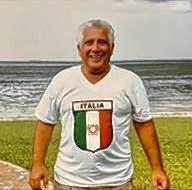Prejudice: “an irrational attitude of hostility directed against an individual, a group, or race, or their supposed characteristics.” – MERRIAM-WEBSTER Dictionary
When I mention anti-Italian prejudice, people giggle, though it wasn’t my intent to make them laugh. Regular folk wave their hands and say, “Are you kidding? Look around. Italian Americans live in the suburbs, their kids go to college, people love Italian food. Get over it!”
The reaction of media people is even more condescending. Their metric is that Italian Americans are now considered “white,” and, therefore, they haven’t suffered the horrible historical indignities inflicted upon African Americans (slavery and Jim Crow), Native Americans (near-annihilation), and Asian Americans (internment camps).
This is largely true; however, being journalists, they should take the next step and do some genuine research on Italian American history. They would discover that, unlike other “white ethnics,” Italian Americans were subjected to consistent brutalities not visited upon the Irish, Jews, Greeks, etc. These included lynchings (New Orleans, 1891), deportations (Palmer Raids, 1919/20), public executions (Sacco and Vanzetti, 1927), and being labeled by the U.S. government as “enemy aliens” (600,000 of them, 1942, with 10,000 Italian Americans in California evicted from homes and jobs).
(Note: Jewish American Leo Frank was lynched in Atlanta, Georgia in 1913 but this is one incident compared to the over 50 – and still counting – documented lynchings of Italian Americans in the Deep South.)
What regular folks and journalists don’t realize is that it they’re both responsible for promoting anti-Italian prejudice, and via the same means: their refusal to recognize the gap between “reel” Italians (Hollywood) and “real” Italians (what we’re like in real life). It wasn’t until relatively recently that Italian Americans were considered “white.” A 1983 cover story in the New York Times Magazine acknowledged the sudden ascendance of Italian Americans in every sector of our society, from politicians and priests (NY governor Mario Cuomo and Cardinal Joseph Bernardin in Chicago) to businessmen and baseball managers (Lee Iacocca of Chrysler and Tommy Lasorda of the Dodgers).
Even the 2017 independent film, Sorry to Bother You, had a scene in which Black and Hispanic activists talked about taking on the white power structure, listing white group like “the Italians.” Said one character: “Italians? When did Italians become white?” The response: “About forty years ago!”
That response was followed with laughter, the same kind of laughter exhibited by the aforementioned regular people and mediacrats. What it all boils down is simple: a basic lack-of-respect toward Italian Americans – individually, collectively, and historically. Prejudice doesn’t just refer to housing or job discrimination. It can be something even more insidious: a generalized disdain floating in the ether, which freely allows others to either denigrate Italian Americans publicly (via late night talk shows or YouTube parodies like “Bensonhurst Spelling Bee”) or to essentially ignore our history (via the media).
And where do people get such cues about Italians? From popular culture, where our main media images – mobsters or morons – remain frozen in time.
The nay-sayers are somewhat right: Italian Americans have “made it” – that is, if material success is your gauge. But, as we can see with the recent flowering of movies dedicated to more balanced and complex portrayals of other racial, religious or sexual groups, material success counts for very little if your fellow Americans – including, I might add, new immigrants from Africa, South Asia, and Eastern Europe – know nothing about Italian Americans except what they see on movies and TV shows. I can use one among many anecdotal examples from one of my former high school students, a kid from El Salvador who once asked me, “You’re Italian? Do you swear a lot with your friends?” (Note: He got this idea from endlessly watching Goodfellas.)
And, shockingly, it’s not just from the mouth of babes. As the Chicago Sun-Times reporter Maureen O’Donnell noted in a 2007 opinion piece on The Sopranos, she was appalled at the constant insults against Italian Americans by people she worked with in social settings:
“I recently sat at a banquet table and listened to a highly educated person joke about a way to solve a problem. “Do you know anyone named Vinnie or Mario?” he asked, brushing under his chin for emphasis….I’ve covered stories with journalists from all across the nation – people who have presumably achieved a certain level of sophistication – and I’ve heard them make ignorant comments about “wops” or that Italians are prone to criminality….I’ve known reporters who have been asked if they’re “connected” because their names end in a vowel…I heard a Red Bull radio commercial in which an Italian-accented character named “Luigi” at Pier No. 13 is trying to fit someone with concrete shoes, which didn’t work as the victim drank Red Bull, which ‘gave him wings.’ I heard another radio spot in which a girl introduces her aghast dad to her new boyfriend–‘Rocco.’ ”
O’Donnell then goes on to note how her own Italian relatives (she married an Italian American man but kept her maiden name) are war veterans who defended America, one of them a researcher who now screens tissue samples for cancer.
She notes: “My husband’s relatives have names like Annunziata, Arcangelo, Pasqualina, and Rosaria. Say them out loud. Those aren’t mob names. They’re music.”
Maybe to O’Donnell; but, to the great unwashed masses, thanks to media prejudice, those names still come with either shadowy associations or intimations of idiocy.
Ironically, since that 1983 New York Times Magazine piece (nearly 40 years indeed!), Italian Americans have become even more mainstream and assimilated, yet our fossilized media images remain constant. O’Donnell’s concluding point gets to the title of my piece: Reel life vs Real life – that is, images which Hollywood and the media promote as “Italian American” vs. what Italian Americans are like in-person, face-to-face.


Quick examples: The Italian American community recently lost two literary giants, both poets: Lawrence Ferlinghetti (Feb. 2021) and Diane di Prima (October, 2020). Ferlinghetti and di Prima were central to the Beat Poetry movement of the 1950s, people who advanced American intellectuality and promoted social change. There was also a third poet, for good measure: Gregory Corso, who passed away in 2001, of whom Beat author Jack Kerouac stated, “(Corso) rose like an angel over the roof tops and sang Italian songs as sweet as Caruso and Sinatra, but in words.”
And last month, a popular and beloved businessman from Illinois, Richard Iosso, passed way. Here is what it stated in his obit:

“In 1967, Iosso developed several breakthrough metallurgical processes, including a chrome-plating method that makes zinc harder. It was patented in 27 countries and parts using his innovative process were used in the Apollo 11 mission that flew Neil Armstrong and Buzz Aldrin to the moon.” (Daily Herald).
Can you name any recent Hollywood films, TV shows, books, etc., which feature Italian American as poets or technological innovators? I know the answer.
Italian Americans are a proud people. They are loathe to complain about things (“It’s just a movie!”), and are quick to wince at anything suggesting victim status (“Italian Americans don’t do protest marches”). But, sad to say, it is precisely these attitudes which have largely caused this predicament I have just mentioned, the contrast between “reel” vs. “real.” The best defense against ignorance isn’t to ignore it, but to confront it and correct it.
And imagine how much easier this job would be if Hollywood and the media “had our backs” for a change, promoting the overwhelming positivity of our culture, past and present – a positivity which, on a daily basis, continues to be corroded by negativity, caricature, and, yes, prejudice. -BDC




Everyone knows about the internment of Japanese Americans during World War II.
How many know about Camp Missoula where Italian Americans were interred at the same time? How many know that Joe DiMaggio’s father couldn’t go to his restaurant because he
was moved inland?
As an Italian American, you did hit the nail right on the head . “Italian Americans are a proud people.” That is, those Italian American who really know where they came from.
I was raised in a 100% Italian American Family with all of the traditions and upbringings that any Italian American cultural neighborhood had.
Sad to say, unless you still live in that environment, you no longer have those memories to cling to.
There is a general malaise in the Italian American Community, just as you say, “Are you kidding?” when someone wants to take up “arms” against the ills of others criticizing us.
This, because the more assimilation the more that Italian Cultural thing becomes a distant and then far flung memory.
Unless the full blooded Italian Americans or those of partial blood whose heritage means something to them stand up to these morons, nothing will be accomplished and the distant memories will always see us as Buffoons, Wise Guys, Guido’s and peasants.
We need to stop belonging to so called organizations that like to give accolades, certificates and awards to our own for the sake of doing so and we need to stop being “spaccones” parading around because we became someone or “cafones” for acting like fools.
Then and only then, will we be taken seriously and earn the respect of others!
Bill:
Other two examples of great Italian “maestri” who recently passed away:
1) Armando ‘Chick” Corea (Calabria) – jazz composer and innovator (25 Grammy Awards)
2) Arturo di Modica (Sicily) – author or the most iconic NYC sculpture, the Wall Street Charging Bull.
I doubt you will see them on Google doodles or on a Netflix special: they are Southern Italian men.
UNESCO has noted that over 60 %of the wolrd’s cultural patrimony is housed in Italy.
France’s culture originated in Italy. Their language (Latin) their culinary arts, their ballet ( originated during the Renaissance and danced in the homes of the wealthy families), music,
social graces—- the origins of French culture was born in Italy. Does anyone acknowledge this? Certainly not the French!
Classical music originated in Italy, as did the opera as well as many forms of architecture, accounting, chemistry,etc.
I visited Monticello in Virginia, the guide talked about the Jefferson home and how Jefferson designed it. No mention was made that the home was designed by Palladio whose architecture was imitated throughout Europe, or that Jefferson loved Italy and tried to imitate their way of life at Montecello. Guides, sometimes have to be corrected.
Einstein is known as a genius, but Enrico Fermi, the Father of the Nuclear Age was a leader of mechanical, quantum, nuclear, and other areas of physics. Read ‘The Last Man Who Knew Everything”by David Schwartz to learn about his true genius. His name is practically unknown. Another unknown name was that of Meiucci. Meiucci was credited with the invention of the telephone by the U.S courts, but to this day children are taught the Bell invented the telephone. Marconi’s radio waves that made possible our world of communication and entertainment ,radio, T.V. and even to this day cell phones and other ‘Waves” of communication. So many, many contributions made by the Italians which have brought civility and culture to the world, too many to list here, but they include notable examples in science, engineering, the arts, music. In every aspic of our lives, there is or was an Italian that contributed to the advancement of our way of life.
Recently I read an obituary of an Italian scientist who was able to X-ray outer space and made it possible to study the black holes in space. No mention was made of his work or his name.But, had he been a criminal, his name would appear in every newspaper.
When Xi Jinping visited Italy last year , he noted that China brought culture and civilization to the east and Italy brought culture and civilization to the west. How many Americans can accept that?
There are Italians today that are at the forefront of the arts, science space, engineering but whose names are hardly acknowledged. Research them, find out about their contributions. It will bring you pride and bring a sense of confidence and encouragement to your children and inspire them.
Italians have a responsibility to learn about their heritage, defend it and pass it on to the next generation. If we choose not to do so, others will trample upon it, ignore it and it will be lost. As it is, history has been rewritten and continues to be rewritten according to the group that is in power.
If the only models our people have are the reel models, they will imitate them, if the models we have show that we are part of the richest culture in the west, perhaps, our children will stand tall, take pride and defend and model the persons who have given us so much to be proud.
Learn about your heritage, defend it against those that would wipe their feet on it and teach it to your children. It is our only hope to take back our history and give pride and confidence to our children.